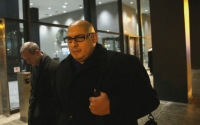Four takeaways from the Jameis Winston investigation

On Thursday, Florida State quarterback Jameis Winston found out from the state’s attorney that he wouldn’t be charged with sexual assault. The announcement to not charge Winston, which was expected in the hours leading up to the state attorney’s press conference, allows the star quarterback to stay on the field for his team’s conference championship game this weekend. If the Seminoles win Saturday, they will play for the national championship for the first time since 2001.
"We've carefully examined all the evidence in this case and have concluded that no charges will be filed against anyone in this case," Willie Meggs, the state attorney for the Second Judicial Circuit said.
But even as Meggs called the Winston investigation a closed case, there’s still uncertainty as to how the Winston case, which was addressed nearly a year later, will help schools prevent and address these cases in a more timely fashion.
In the last two years, there have been at least 18 players accused or arrested on sexual assault charges or crimes involving sex. As we reported on during our Sex Crimes on Campus series, there are still many questions about how universities and the NCAA handle situations involving student-athletes and sexual assault or crimes involving sex.
America Tonight broke down the data behind the 18 reported instances of players accused or arrested on sexual assault charges or crimes involving sex in the last two years. Before the Heisman Trophy frontrunner heads back onto the field for the No. 1 team in the nation, we look at four big takeaways and recent trends when it comes to alleged sexual assault in college football in the last two years.
Almost three-fourths of the players accused of or arrested of sexual assault were dismissed from their teams

If recent history were any indication, then an arrest in the Winston case would have had a different ending for the Florida State and the team.
In the last two years, arrests made in cases involving alleged sexual assault or cases where sex was involved resulted in 13 players being kicked off their teams and schools. That’s a dismissal rate of 72 percent.
Research conducted by America Tonight found that athletics programs have been swift in punishing college football players linked to these allegations. In 10 of the 13 cases, it took, on average, almost four days for programs to dismiss players after news of this kind of arrest was made public knowledge.
The data has indicated that most of the cases of football players getting kicked off their teams for these kinds of allegations or charges has also resulted in dismissals from their respective campuses. Just one player in this group, d’Vante Henry, a former linebacker at West Virginia University who reportedly entered a woman’s apartment in September and attempted to force himself upon her, still has an active or publicly available university email address.
Florida State's James Wilder Jr., was arrested three times in 11 months and didn't miss a game

News of the sexual assault investigation against the Heisman Trophy frontrunner was not the first time this year the Seminoles dealt with sexual assault accusations against one of their players. In June, wide receiver Greg Dent, who was projected to be a prime weapon for Winston this year, was arraigned on second-degree sexual assault charges after allegedly attempting to have sex with a friend who had stayed on his couch. One day later, Dent was dismissed from the team.
During the Winston coverage, Florida State was applauded for its university policy, which makes student-athletes facing felony charges ineligible from competition until all charges are cleared.
But when it comes to how the university and the athletics program handles athletes who are arrested, it’s a different story. For example, take James Wilder Jr., the FSU running back, who didn’t miss a game despite being arrested three times in an 11-month period. (None of the arrests involved sexual assault.)
"The punishment for misdemeanor offenses for student-athletes at Florida State rest with the head coach. However, no student-athlete can represent the university until any jail time related to a misdemeanor is completed,” Rob Wilson, Florida State’s associate athletics director for communications, said of Wilder’s third arrest in “The System: The Glory and Scandal of Big-Time College Football.” (Full disclosure: I was the lead researcher for “The System.”) “A felony offense means immediate suspension for any FSU student-athlete. So Mr. Wilder’s punishment has been and is in the hands of the football coach at this time.”
This season, Wilder, who hasn’t missed a game due to suspension, has run for 517 yards and eight touchdowns.
(Interesting to note that attorney Tim Jansen, Winston’s lawyer, also represented Wilder and Dent with their legal issues.)
A lack of an NCAA policy on sexual assault allows for players who've been arrested or accused of sexual assault to transfer

One element that has remained absent amid the coverage of the Winston case was talk of the lack of a standard NCAA policy on student-athletes accused of sexual assaults.
While student-athletes are held to the same rules used by universities in responding to sexual assaults on campus, there is a general perception that student-athletes are sometimes let off easy by their schools due to their increased public profiles.
Lawyer Trisha Ananiades argued in “Penalty on the Field: Creating a NCAA Sexual Assault Policy” that a lack of a standard NCAA policy on sexual assault allows student-athletes to transfer schools and continue to play in their respective sport. Ananiades cited the case of Frostee Rucker, who was accused of sexual assault in 2002 during his time at Colorado State. Rucker was allowed to transfer, and eventually start, for the University of Southern California that won the national championship in 2004.
Though these cases are rare, they still happen. At Baylor University, defensive end Tevin Elliott was accused of three counts of sexual assault, stemming from an April 2012 party in Waco, Texas. Despite being suspended indefinitely by the team, Elliott transferred to the University of Central Arkansas the following season. While there, he was indicted on the charges before ever playing a game for his new school. He’d then leave the NCAA altogether, enrolling at Bacone College of the National Association of Intercollegiate Athletics. A Bacone spokesman told America Tonight in September that Elliott, who posted a photo of himself in a Bacone jersey to his Facebook account, was not a part of the football team.
As the Winston case shows, some accusations and investigations go up in smoke

During his Thursday press conference, Meggs repeatedly said that the Winston investigation didn’t produce enough evidence to pursue a conviction.
"We have a duty as prosecutors to determine if each case has a reasonable likelihood of conviction," Meggs said during the press conference. "After reviewing the facts in this case, we do not feel that we can reach those burdens."
Winston’s case is not an isolated instance. To date, four of the 18 players who’ve been accused of sexual assault or a crime involving sex in the last two years have had their charges dropped, did not have charges formally filed against them or were falsely accused.
The day before last year’s Alamo Bowl, the University of Texas sent home quarterback Case McCoy and linebacker Jordan Hicks for breaking team rules. The suspensions followed a report from a local San Antonio TV station that two unidentified players, later confirmed to be McCoy and Hicks, were faced with sexual assault allegations. In January, both players were reinstated. Charges were never filed against either player, and the San Antonio Police Department said the case is closed.
Two out of the three former football players at the U.S. Naval Academy remain entangled in an ongoing sexual assault investigation. The third, Tra’ves Bush, had his charges dismissed in October. Bush, the former Navy safety who was accused of aggravated sexual assault, is still accused of making false statements, and his graduation is currently on hold due to the investigation.
While national research has found that a false accusation of rape is rare, that’s what happened for Praise Martin-Oguike, the former Temple University linebacker who was kicked out of school on a sexual assault allegation in the spring of 2012. Eighteen months later, the female accuser’s cell phone records revealed that the relationship Martin-Oguike had with the girl was consensual, resulting in the charges being dropped.
For more coverage, check out our Sex Crimes on Campus portal.





















Error
Sorry, your comment was not saved due to a technical problem. Please try again later or using a different browser.